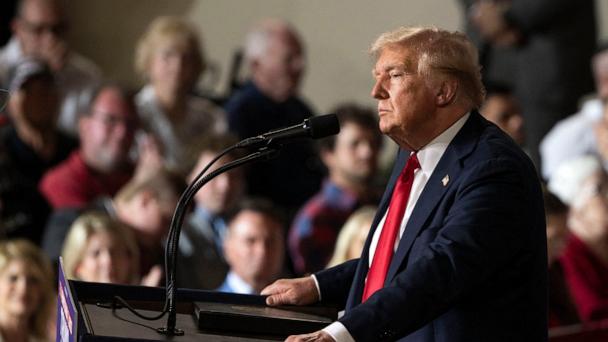Manhattan DA suggests non-prison sentence for Trump in hush money case

Donald Trump could receive a non-incarceratory sentence -- or his sentencing could be delayed until he leaves office -- in lieu of his criminal hush money conviction being dismissed entirely, Manhattan District Attorney Alvin Bragg argued in a court filing unsealed Tuesday.
The district attorney urged New York Judge Juan Merchan to reject Trump's request to throw out the jury's verdict and dismiss the case on the grounds of presidential immunity, arguing the request goes "well beyond what is necessary to protect the presidency."
"The People acknowledge the importance of an orderly executive transition and the peaceful transfer of power, but those interests do not require the extraordinary step of abating post-trial motion practice in a pre-existing criminal case," the filing said.
The filing mentioned the possibility of Trump receiving an unconditional discharge -- i.e., being released at sentencing with no conditions -- to push back on Trump's arguments about presidential immunity, many of which presuppose he would receive an incarcerated sentence.
Bragg noted that Judge Merchan "is not required to impose a sentence of incarceration at all" because Trump has no prior criminal history and was only convicted of Class E felonies.
"The Court could therefore conclude that presidential immunity, while not requiring dismissal, nonetheless would require a non-incarceratory sentence in these circumstances," the filing said. "Such a constitutional limitation on the range of available sentences would further diminish any impact on defendant's presidential decisionmaking without going so far as to discard the indictment and jury verdict altogether."
Trump was found guilty in May on 34 felony counts of falsifying business records related to a hush money payment made to adult film actress Stormy Daniels in order to boost his electoral prospects in the 2016 presidential election.
His sentencing has been delayed three times and he is now pushing to have the case dismissed entirely as he prepares to return to the White House following his reelection in November.
Trump's lawyers had argued that the case should be tossed because Trump, as president-elect, is immune from prosecution during the transition phase -- a claim Bragg rejected in his filing.
"There are no grounds for such relief now, prior to defendant's inauguration, because President-elect immunity does not exist," Bragg's filing said. "And even after the inauguration, defendant's temporary immunity as the sitting President will still not justify the extreme remedy of discarding the jury's unanimous guilty verdict and wiping out the already-completed phases of this criminal proceeding."
Prosecutors suggested either delaying sentencing until Trump leaves office, or terminating the proceedings "with a notation that the jury verdict has not been vacated and the indictment has not been dismissed."
The filing also criticized Trump's lawyers for rehashing arguments that the court has already rejected and over-interpreting the prohibition on cases against a sitting president, arguing that Trump's "sweeping argument disregard the careful limits that the Supreme Court and the Department of Justice's Office of Legal Counsel (OLC) have placed on presidential immunity."
"Defendant's requested relief would go well beyond what is necessary to protect the presidency and would subvert the compelling public interest in preserving the jury's unanimous verdict and upholding the rule of law," the filing said.
Trump's federal election interference case was thrown out last month due to the Justice Department's standing policy prohibiting the prosecution of a sitting president, and a federal appeals court dropped Trump from the government's ongoing appeal of special counsel Jack Smith's classified documents case based on the same policy.







